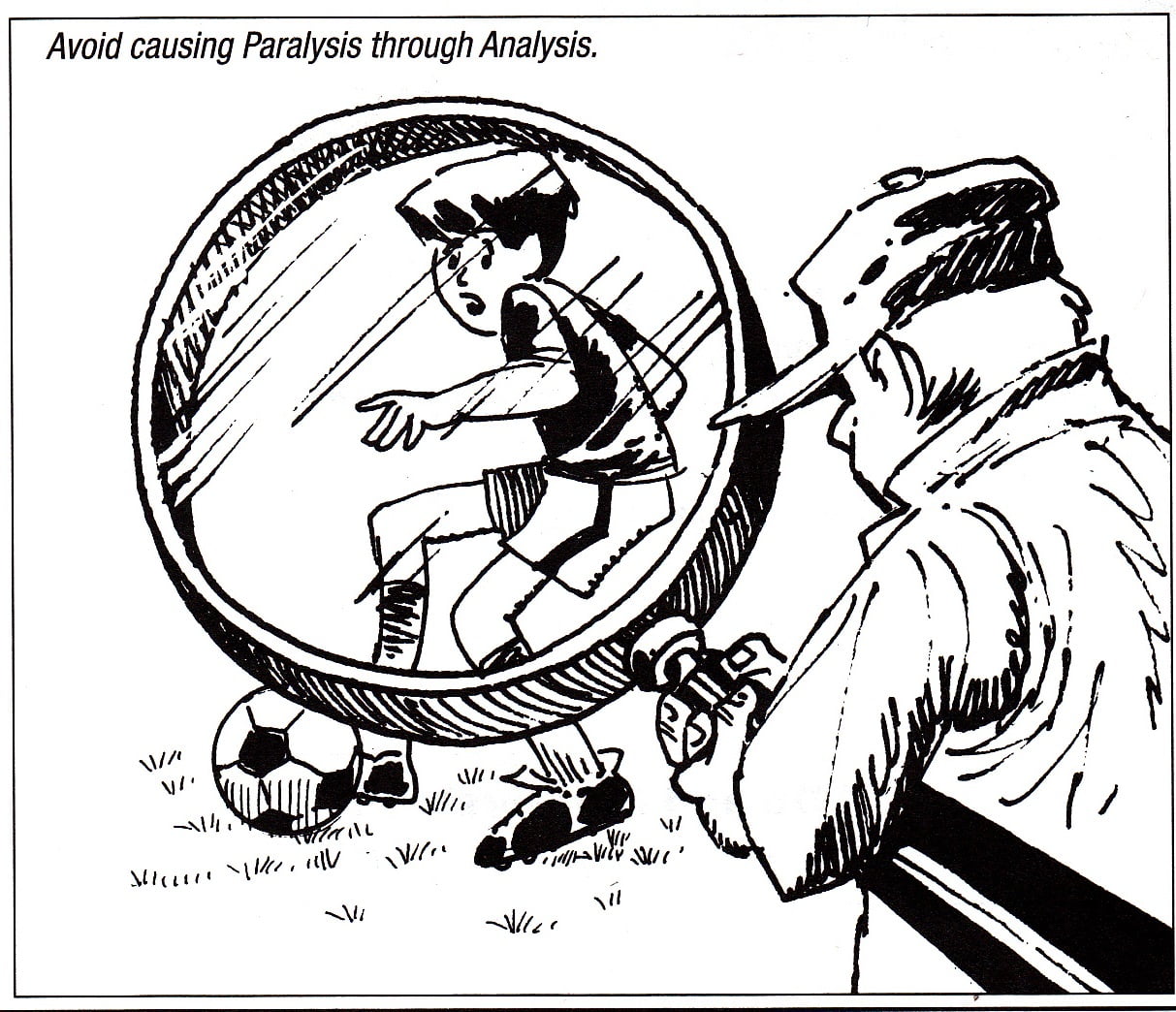From observing soccer coaches both in practice and clinic situations, I would like to pinpoint some of the common errors. The more you know about them, the more prepared you will be to spot them and correct them – and improve your chances of winning.

1. Poor coaching position. You can only coach what you can see. If you stand in the middle of a practice, you will see only half of it. To see as much of the practice situation as possible, you should set yourself up on the edge of the practice or game area.
Always look at the big picture before telescoping into coach. Get the mini-picture right, and then return to the big picture again. Think of a mosaic composed of 1,000 tiles. You stand back and view the whole mosaic. You see that one of the tiles is dirty. So you telescope in and clean that tile. Once done, you stand back and look at the big picture again.
2. Drill and rote-based. Too many coaching situations are an organizational masterpiece with players standing in a perfect line. The drill becomes more important than the learning—results: Great Drillers and Rotten Players.
Games and players go together; soccer is an open-skill sport, which means players have to problem-solve every few seconds. By reproducing game-like activities, the players learn to read the game pictures. And the more that youngsters play in mini-game environments like 4 v 4, the faster they can read and the more aware they become.
Children always invent games. They know how to connect fun and learning through games. They are the experts.
3. Fan coaching. Many inexperienced coaches act like the fans in the stands: They react to everything that moves. Their continual chatter tends to become annoying to the players who are trying to concentrate. The good advice is lost in the avalanche of words.
Too much information confuses youngsters. Keep your coaching points concise and specific – simple and to the point. Remember, one dime’s worth of coaching is equivalent to one dollar’s worth of practice.
Coach knowledge, not information. Knowledge is about discipline, understanding, and awareness. It’s a positive problem solving – stopping the action, correcting an error, and then continuing.
Spewing out information, on the other hand, has no discipline. It’s just throwing verbal Band-Aids on every error. The whole session becomes a blur of unrelated incidents. The focus is lost, and the practice loses its meaning and direction.
4. Coaching the game and not the players. This partly ties into the “fan coach” mentality. Big statements such as “make space” and “don’t bunch” may be actual observations. Still, a good coach will stop, correct, and individualize his instruction to a specific player.
Good coaches are like good doctors. They treat each individual’s specific problem. You never see them walk into their waiting room and start throwing aspirins at everyone, every patient. They recognize each patient as a different specific problem. They will diagnose the problem and then make it right, just like a coach would do with a soccer player.
5. Cosmetic coaching. Setting up situations that make the player happy may look good, but is anyone learning anything? Many sessions are cute, filled with candy ideas, but lack substance, and directions. There has to be a purpose and a method to help youngsters improve.
6. Progress not related to the players. This is where the coach is so organized that he becomes a slave to his preparation plans. He should be sensitive to his players and their progress.
7. Not seeing the key playing errors and overlooking or misinterpreting mistakes. Practice, study, and experience will help solve this problem area.
8. Poor organization. This is often due to a lack of thought and preparation for the session. For example:
- Lack of continuity to the session. Every session must have a beginning, a middle, and an end.
- No targets. This is particularly true of defenders who have just gained possession and don’t do anything positive with the ball. As in a real game, they have to score.
- Poor starting service. If the service is poor, the practice dissolves. This is particularly true whenever you are teaching heading or volleying. A quality service will lead to successful skills and team play.
- Be disciplined. Focus on just two or three points. Think of television advertising and a rabbit selling the same message over and over again. Coaching is just the same!

Coach Graham Ramsay
DoC, Author, Clinician, etc. Etc.

FUNdamental SOCCER Suggestions
• Prepare your sessions – Have a theme and know the key to coaching points within it. Create small-sided games to highlight these points.
• Become the Energizer bunny – Repeat a couple of messages over and over again. Repetition makes for permanency.
• Equipment – Have your players set up the field beforehand: cones, corner flags, pennies, balls. It’s a great time-saver.
• Project your personality – Make the players see that you enjoy the experience. Enthusiasm is contagious.
• Consider the conditions – Number of players attending, sun, wind, playing surface.
• Keep a record of your session.
• Evaluate each session.
• Consider using the FUNdamental ‘9-Step Practice’ flow.




